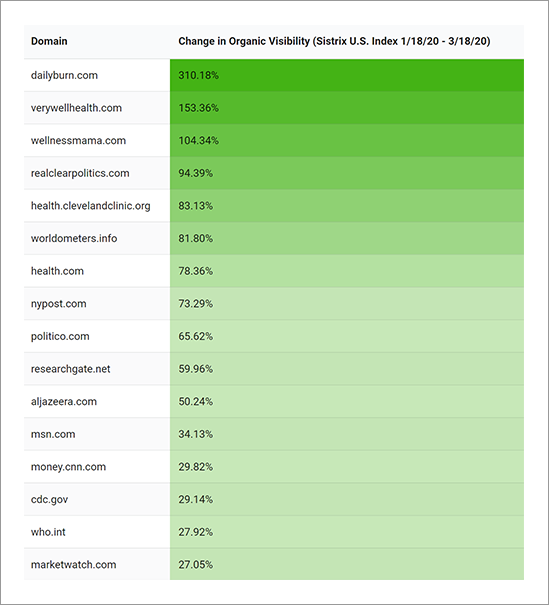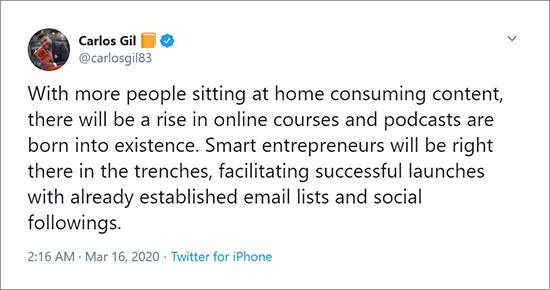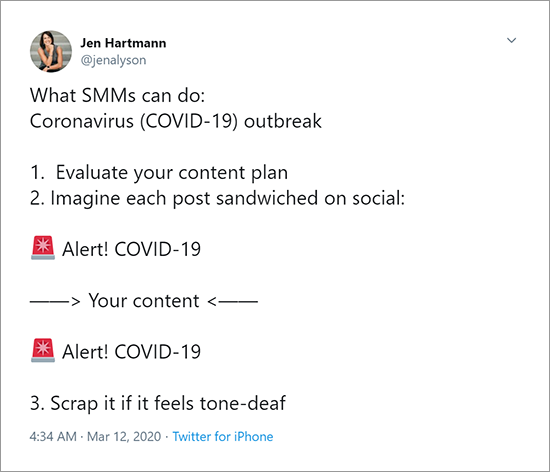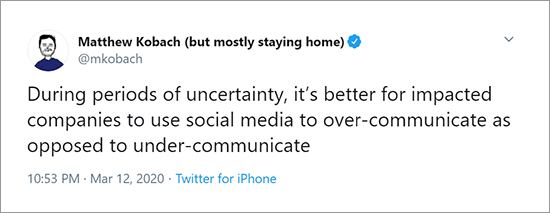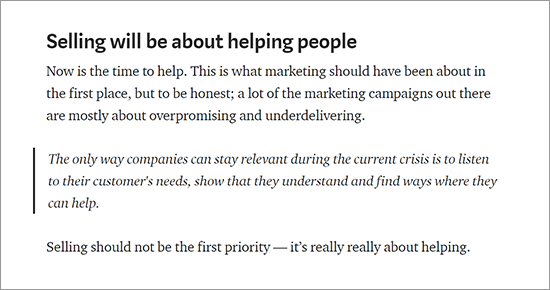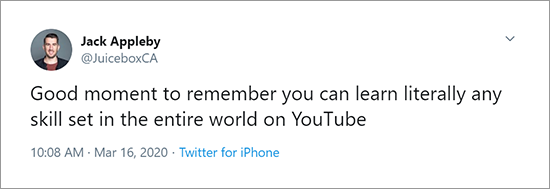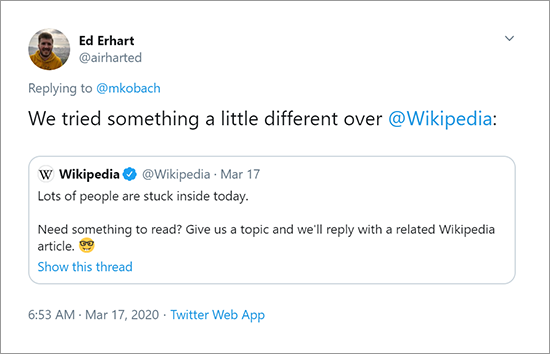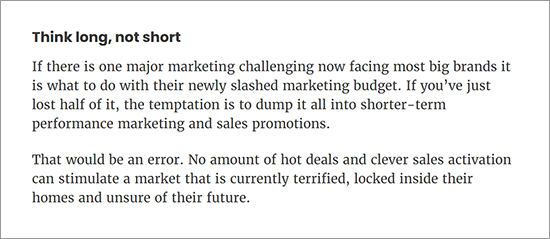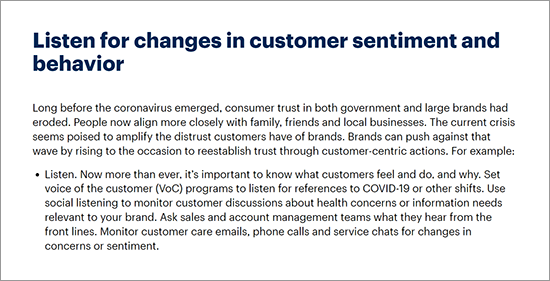
Stocks are in freefall, economies are being disrupted, our home and work lives are undergoing seismic changes - the likes we’ve never experienced. And its just the beginning.
But with disruption, comes a need to adapt. To make sense of this shifting landscape we here at SEOptimer took a step back to understand how marketers on the front line are adapting, pivoting and optimizing. The more we can learn together and support each other as a community, the better.
1. Organic traffic is being heavily impacted but it depends on your industry
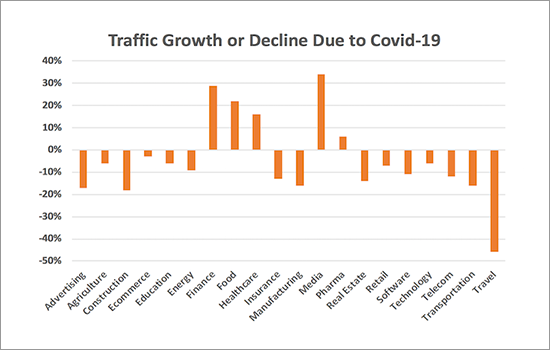
Traffic data from SEO industry leader, Neil Patel
Website traffic has understandably taken a hit with the Travel industry suffering the biggest decline by far. During this time Neil Patel suggests “when you see your competitors closing down or slowing down on their marketing, the goal is to double down. You may not see the biggest return right away, but in the long term, you will.” For industries suffering big traffic dips, it may be worth looking at opportunities off-site. Social media is the obvious candidate here. Reddit is reporting surges of 20-50% in traffic to some subreddits during the Coronavirus outbreak. Online forums and discussion boards specific to certain industries could also represent opportunities for brands too. Brands typically perform social listening across online communities to understand what themes and subjects are resonating with their audiences. However during this time, there may be opportunities for brands to enter into conversations and add value in spaces where they may not previously have ventured.
Some marketers are also using this time to finish items on their digital to-do lists. One particular area often neglected is Conversion Rate Optimization (CRO). Thrive Agency suggests the first step is to perform a CRO audit for your website to ensure your call-to-actions (CTAs) are turning leads into customers especially during times of low traffic or reduced budgets.
2. Search behaviors are changing
Lily Ray is the Director of SEO at Path Interactive
While traffic is down across several categories, some categories in Google's YMYL (your money, your life) category are experiencing big growth in search volumes as consumers are trying to find out more information about the Coronavirus. Topics around media, finance, food and healthcare are all up.
Sistrix looked at US searches in the news and health industries and mapped the rate of growth in organic visibility of these sites from Jan 18 to Mar 18. Topping the list was dailyburn.com who provide on-demand workout videos that you can do from home.
If possible, your organization or client may be able to leverage News SEO optimization. Greg Jarboe, President at SEO-PR says SEO professionals "may not even realize just how useful press release SEO can be". While News SEO is crucial to journalists and PR professionals, if your brand can rapidly publish authoritative news content in your industry you may benefit from this same uplift as a result of changing search behavior.
3. Consumers' time spent on social media is increasing
Carlos Gil is the author of “The End of Marketing”
Media consumption is undergoing huge changes. In the US, measurement firm Nielsen noticed a 22% jump in TV consumption in just 1 city in 1 week. We know historically that in times of crisis, TV viewership can increase nearly 60%. The same is true for social media. In Italy, video streaming on social increased by 66% in February as more people are online and are spending more time in the News Feed.
What can your brand or client do with this increased dwell time on social? As more of the population is now working from home, this could be a great time to consider launching online product offerings or services. For content marketers, always look for opportunities to add value, be unique and adapt your message for an at-home audience.
4. When planning content, be mindful of context
Jen Hartmann runs PR & Social Strategy for John Deere
Content you scheduled last week may not be appropriate to post this week. Stay agile and try to maintain a flexible publishing schedule. Most marketers are removing scheduled social content and instead publishing posts live. For brands in affected industries, this is important to ensure comms are relevant amid the evolving landscape.
Also, be aware that previous scheduling windows may no longer be appropriate as people’s working hours are now changing as a result of working from home and having to juggle kids and family commitments. Lauren Teague from agency Convince&Convert said “I’m prioritizing time first thing in the morning, from 5-7 AM, and after my kids go to bed, 8-10 PM as primary hours that I can be online. I won’t see a lot of social content or participate in the conversations that are happening during [traditional] work hours, and I know I’m not alone”.
5. Businesses affected by Coronavirus need to over-communicate
Matthew Kobach is Head of Social Media for the NYSE
If your business or your client is in an impacted industry (ie travel, entertainment, retail, hospitality, etc) do not retreat, keep comms up. Updates are accelerating and consumers are drowning in news (real & fake). To be an authoritative voice and offer value to your community, you must be present.
In their latest Coronavirus blog post, Twitter notes that “In times of crises, people want credible information. 75% of COVID-19 related Tweets are actually Retweets. In other words, the primary method of sharing information during a time of crisis is through Retweeting.” While your brand may not be authoring content directly about COVID-19 or on Twitter for that matter, its still important to think about the shareability potential of your content and consider using short, to-the-point updates if you or your client operate in an impacted industry during this crisis.
6. Let’s not forget, this is a crisis and people need help
Jonas Bladt Hansen is the owner of agency Inversus
What can your brand or client do to add value? Brands who are genuinely offering help to their customers or the broader public will be valued in-turn. We've seen countless examples of brands genuinely helping during this crisis. LVMH famously switched from perfume to manufacturing hydroalcoholic gel (hand sanitizer) to help depleted stock across French hospitals. Publishers like The New York Times are removing paywalls for Coronavirus content. Consumer brands like Reebok are offering free customized workouts to do from home. These acts of goodwill from brands will be remembered and help build trust and throughout the community. CMO Network's Jeff Fromm said "Empathy will help your brand survive COVID-19".
7. If its time to adjust or pivot, YouTube is a great place to start
Jack Appleby is Strategy Director at RGA
For freelancers, marketing consultants and small agencies, now may be the best time to learn new skills and broaden your digital marketing knowledge. YouTube is the home of How-To’s, explainers and walkthroughs so get searching and learn something new.
Apart from YouTube, many experts in their fields are running free classes and workshops on Facebook Live and Instagram Live. Class Central has compiled a list of over 450 courses that you can take online for free. Carlo Perotta, Senior Lecturer from Monash University believes the Coronavirus could spark an online learning boom. The question will be if the anticipated rapid take-up of online learning becomes a permanent solution or just a temporary crisis response tool?
8. Sometimes you just have to throw out the rule book
Ed Erhart runs Comms at Wikipedia
During this crisis, the opportunity will likely arise to try new things for the first time. Now more than ever we need to remember the digital marketing mantra of ‘test and learn’. Aaron Brooks, Co-Founder of Vamp says that "while there may be a downturn in customer spending, there is an increase in customer touchpoints and attention. If you can adapt and offer them value in this time of uncertainty, you will win their loyalty and when normal life resumes and they do spend again, it will be with you." For most brands, sometimes the first step is to become conversational. This can be difficult for big brands but the ability to have real two-way dialogue with the online community can surface up new opportunities to further build engagement and loyalty.
9. Long term brand-building is key
Mark Ritson is Adjunct Professor of Marketing at Melbourne Business School
We are so focused on tomorrow, next week, next month - and rightly so, things are changing hour by hour. However Mark Ritson talks about “brand salience” - a brand or company’s ability to create a lasting impression through distinctive positioning. Whether this be through branding, mission & values, brand codes, or unique selling propositions - the key for marketers is to build strong brand salience with long-term thinking.
One of the biggest enablers for long term brand-building has been the rise of DTC (Direct to Consumer). This is particularly evident for Retail and CPG (FMCG) brands where they traditionally didn't "own the relationship" with the end customer. These brands which bypass traditional distribution channels and go straight to the consumer are exemplified as the future of retail. Cale Guthrie Weissman from ModernRetail says high-end home DTC brands are seeing a coronavirus lift.
10. Keep listening
Laura Starita is a writer at Gartner
Gathering customer sentiment data through social media, feedback sessions, polls or questionnaires is great to do at any time. But during a crisis its even more important to understand how behavior and attitudes may be evolving over time. There are several tools available for quick and easy social media listening offering invaluable insights into how your customers are thinking and communicating.
Dark social (untrackable social traffic from Messenger, WhatsApp and private groups) could be another great source of customer insight however these sources can't be tracked with social listening tools. The New York Times reports Coronavirus-related industry groups are popping up on Facebook, some like a health care provider group with over 100,000 members are extremely active. While these groups are active and relevant to the crisis now, they may hint at how we organize and converse with industry peers in the future. Now is a good opportunity to search for new groups which are relevant to your brand on Facebook and LinkedIn and continue to keep your finger on the pulse.
Your turn
We’d love to hear from you if you’ve implemented changes or launched new marketing & comms initiatives in the wake of Coronavirus. Tweet us @seoptimer and let us know!

